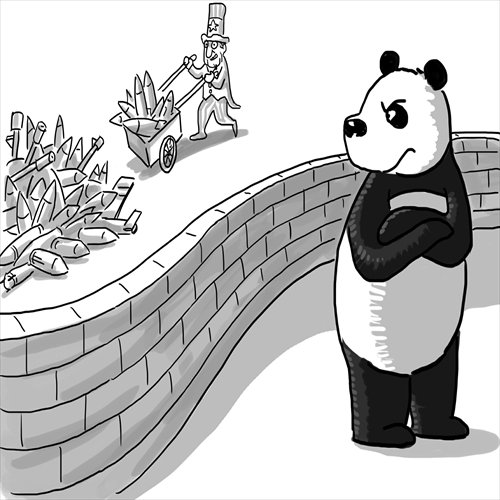Washington uses past foe Vietnam to counter China

Illustration: Liu Rui/GT
US President Barack Obama announced a complete lifting of the arms embargo to Vietnam during his visit to the country. The US military is eager to get something in return, such as access to Vietnamese seaports, especially the strategically-significant Cam Ranh Bay.
This is a new move by the US to advance its rebalance to the Asia-Pacific strategy, displaying Washington's desire to reinforce military cooperation with China's neighboring countries.
The lengthy Vietnam War produced a long-standing feud between Vietnam and the US, and the war was a nightmare in US history. After losing the lives of more than 58,000 US military personnel on Vietnamese soil, the US admitted its defeat. Then US secretary of defense Robert McNamara said the US failed in Vietnam because "We underestimated the power of nationalism to motivate a people to fight and die for their beliefs and values."
Now, Washington is ironically trying to manipulate Vietnam's nationalism to counter China. US Senator John McCain, a prisoner in the Vietnam War and now Chairman of Senate Armed Services Committee, plays a key role in rescinding the decades-old ban on the sale of lethal arms to Vietnam, believing it will rope in Hanoi to counter China's rise.
From 1984 when the Ronald Reagan government officially prohibited sales of military weapons to Vietnam to 2014 when the Obama administration partially relaxed the arms embargo, the policy change has reflected the evolution of the regional geopolitical landscape: The South China Sea dispute offers the US a chance to draw Vietnam over to be a new security partner. In late April, US Secretary of Defense Ashton Carter testified at a congressional hearing, saying it is imperative to improve Vietnam's strength against China.
More importantly, US defense contractors are keen to reach Vietnam's arms market, whose scale will help boost US employment in the arms industry. According to a report by the Stockholm International Peace Research Institute, Vietnam's imports of weapons accounted for 3 percent of the global weapon sales from 2011 to 2015. Vietnam ranks eighth on the list of major weapon importers. Vietnam has purchased Kilo-class submarines from Russia and fighter jets from France, Sweden and Israel. The Americans won't leave this big market behind. Vietnam has reportedly already included P-3C Orion surveillance aircraft on its purchase list.
A new Maritime Security Initiative launched by Carter at the Shangri-La Dialogue in Singapore last year has come into effect. Washington is planning to offer $400 million worth military aid to some Southeast Asian countries. Vietnam is a priority.
Besides military cooperation, Washington is also trying to rope in Hanoi economically. After joining the US-led Trans-Pacific Partnership (TPP), Vietnam hopes its products can enter the US market under more favorable terms. But more profitable market access does not come easily.
Vietnamese garment manufacturers will not be allowed to import raw materials from non-TPP countries, and it will be a setback for Vietnam since one third of its textile raw materials are imported from China. Severing Vietnamese manufacturers' business ties with Chinese companies will distort the global supply chain.
In that circumstance, US customers might have to pay more for Vietnamese-made garments. Thus, the majority of US garment manufacturers oppose the TPP.
Vietnam should weigh in the question of gun versus butter. The proportion of debt in Vietnamese GDP rose from 35 percent in 2009 to 81 percent in 2015. According to Vietnam's official data, the military budget in 2014 was $4.3 billion. Therefore, if Hanoi transfers resources that should have been used to develop the economy to arms deals, the burden will become unbearable.
Although the South China Sea dispute is still the crux of the difficult relationship between China and Vietnam, both sides are employing risk control measures and keeping the bilateral relationship on track. China and Vietnam have successfully demarcated their borders on land and the Beibu Gulf. They can find more wisdom to address the South China Sea dispute.
China is laying the foundation for perennial peace between both countries. Under China's initiative, the Lancang-Mekong Cooperation has been carried out, with China offering $11.5 billion in concessional loans for countries along the river. Vietnam will be a major beneficiary of the new program.
Beijing has always been enhancing strategic mutual trust with its neighbor Hanoi.
The US shouldn't look for Vietnam and other ASEAN nations to pick sides between China and the US, nor should the US turn Vietnam into an ally. Both scenarios will jeopardize regional security.
The author is a research fellow with the Charhar Institute in Beijing and an adjunct fellow at the Chongyang Institute for Financial Studies at Renmin University of China. opinion@globaltimes.com.cn